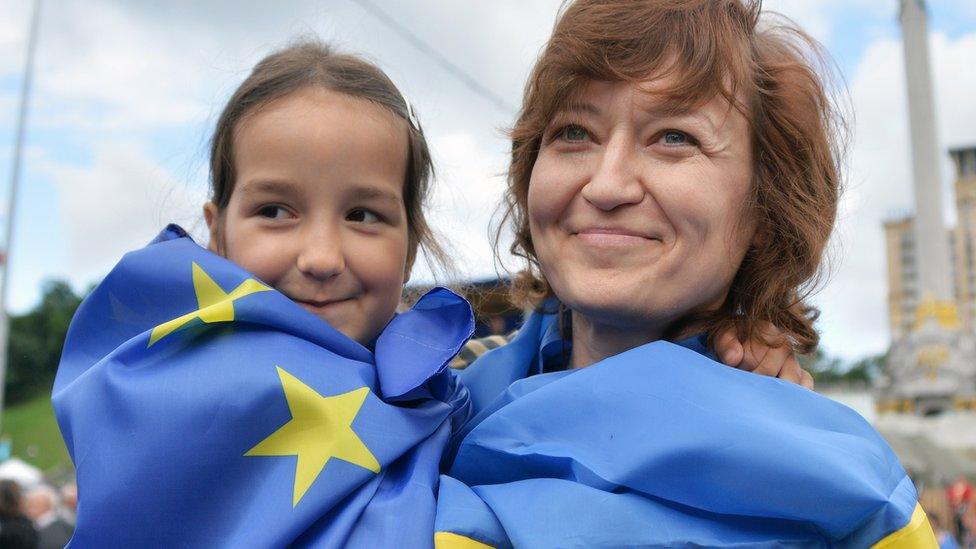Netherlands rejects EU-Ukraine partnership deal
- Published
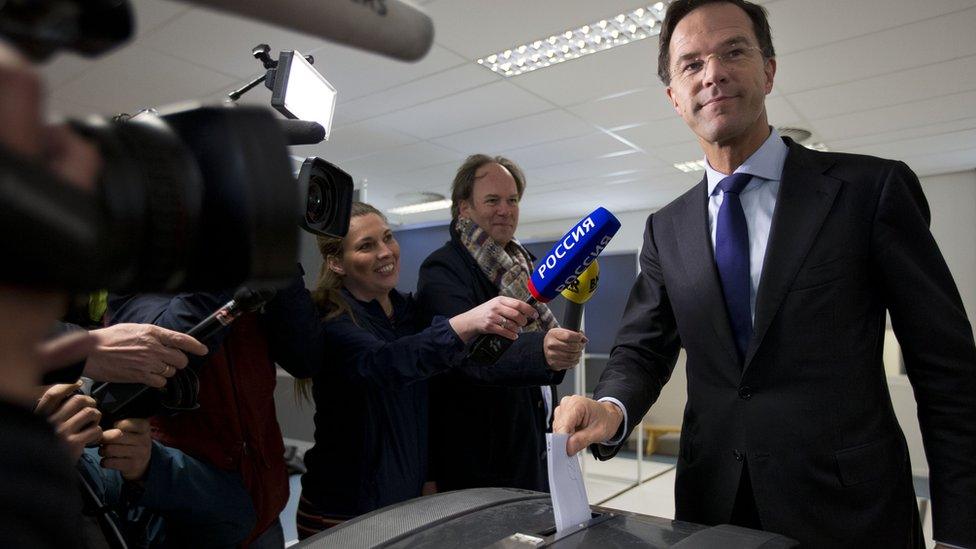
Prime Minister Mark Rutte, followed by a Russian TV crew, cast his vote in The Hague
Voters in the Netherlands have rejected in a referendum an EU partnership deal to remove trade barriers with Ukraine.
Turnout was low, 32.2%, but above the 30% threshold for the vote to be valid. The deal was rejected by 61.1% of votes, compared with 38.1% in favour.
Prime Minister Mark Rutte said the government might have to reconsider the deal, although the vote is not binding.
Ukrainian President Petro Poroshenko insisted his country would "continue our movement towards the EU".
A foreign ministry official in Kiev told the BBC that the result was disappointing, adding that Dutch Eurosceptics could not take Ukraine hostage to express dissatisfaction with the EU.
The vote was widely seen in the Netherlands as a test of public opinion towards the EU.
It was triggered by an internet petition begun by Eurosceptic activists that attracted more than 400,000 signatures.
The result creates a headache for the Dutch government, as the Dutch parliament approved the EU association agreement with Ukraine last year. All the other 27 EU member states have already ratified the deal.
"My view is that if the turnout is more than 30%, with such a victory for the 'No' camp, ratification cannot go ahead without discussion," Mr Rutte said in a televised reaction. It is also an embarrassment for a Dutch government that currently holds the EU presidency.
Geert Wilders, who leads the anti-EU and anti-Islam Freedom Party, said the result was the "beginning of the end for the EU".

Dutch dilemma - by Anna Holligan, BBC News, The Hague
The Dutch have delivered a resounding no, with caveats.
The referendum was ostensibly about Ukraine - but the No campaigners weren't concerned with the intricacies of the trade deal. Two-thirds of the electorate didn't cast their ballot, so some argue the result cannot be taken as a true reflection of anti-EU sentiment.
Dutch PM Mark Rutte has promised to at least acknowledge the result, and politically it will be hard to ignore. Expect weeks or months of protracted discussions in The Hague, and Brussels.
Blow for Ukraine - by Tom Burridge, BBC News, Kiev
The Ukrainian government is adamant that its wide-ranging deal to align itself with the EU will remain on course, despite the Dutch No vote.
There is a huge amount of political will, both among top EU officials and powerful EU member states, namely Germany, for Ukraine's post-revolutionary political order to succeed.
Ukraine's President Petro Poroshenko has insisted the referendum result will "not be a strategic obstacle for Ukraine on the path to Europe". And Dmytro Kuleba, a senior foreign ministry official, told me that "Dutch Eurosceptics cannot take Ukraine hostage to express dissatisfaction about the EU".
Dutch result difficult for Ukraine and EU: More from our correspondents in Kiev and The Hague

The vote comes less than three months before British citizens decide in their own referendum whether to leave the EU altogether.
A spokesman for campaign group Leave.EU, Brian Monteith, said: "This humiliating rejection of the Ukraine agreement demonstrates that people don't have to support the EU and its expansionist agenda to feel European."
Russian Prime Minister Dmitry Medvedev also appeared to welcome the result, tweeting that it was an indication of the European attitude to Ukraine's political system.
The Russian government was vehemently opposed to the EU deal with Ukraine and was widely thought to have pressed then-President Viktor Yanukovych to reject it in November 2013. Mr Yanukovych's decision prompted protests in Kiev that ultimately led to his downfall.
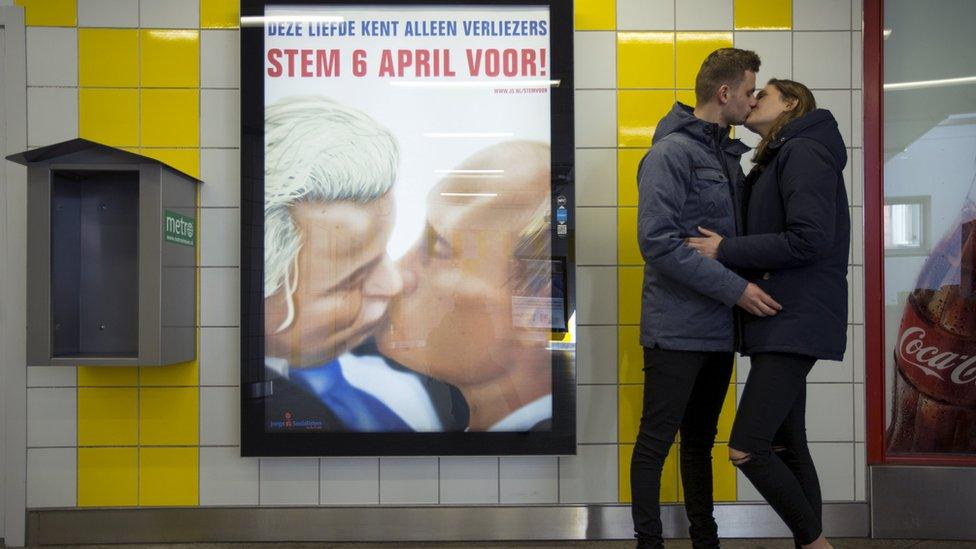
Yes campaigners have accused anti-EU politician Geert Wilders of cosying up to Russia's president
Pro-Russian separatists in eastern Ukraine have widely been blamed for the killing of 298 people when a Malaysia Airlines flight from Amsterdam was shot down in July 2014. The Netherlands lost 193 of its citizens.
The Ukrainian president stressed the non-binding nature of the vote.
"I am sure that strategically this event is not an obstacle on Ukraine's path towards Europe," Interfax-Ukraine news agency reported Mr Poroshenko as saying.
Dutch Interior Minister Ronald Plasterk accepted the cabinet would need to consider the result but added that the government might need to look again at the 2015 referendum law that triggered Wednesday's vote. The minimum threshold could be based on the number of voters rather than the percentage, he suggested.
One of the Dutch Eurosceptics behind the referendum, Thierry Baudet, said there could be more votes in the future, covering the euro, open borders and any future EU trade deal with the United States.
EU Commission President Jean-Claude Juncker had described the stakes in the run-up to the vote as being high, warning that a No vote could trigger a wider crisis in the 28-member bloc.
- Published7 April 2016
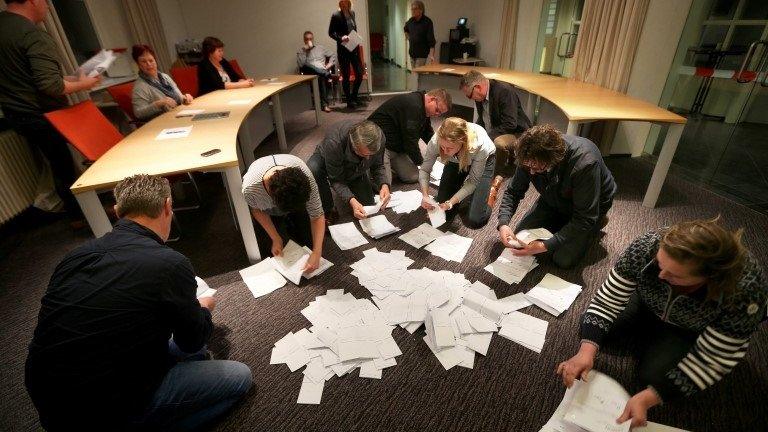
- Published12 March 2016
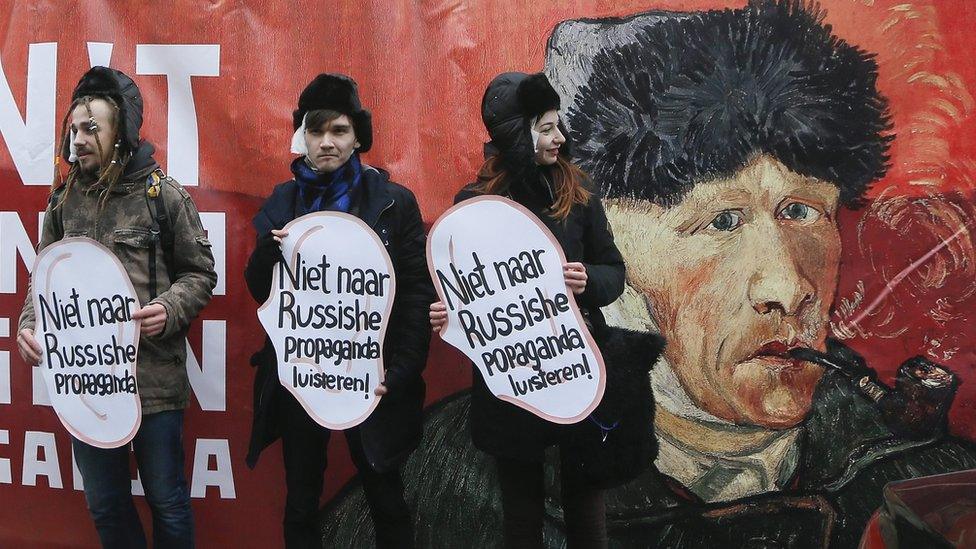
- Published14 October 2015
